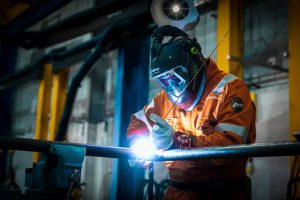Region’s ‘renewables capital’ urged to grasp new opportunities

ENERGY experts are confident that the East Yorkshire and Humber region has the potential to be a leading energy hub but say it now needs to grasp new opportunities to cement its position as a renewables capital.
Hull has marketed itself as the ‘energy city’ with major projects such as Vivergo’s £350m bioethanol plant and the £450m Able Marine Energy Park but now, experts are convinced there are other opportunities for the region to capture.
University of Hull lecturer in earth science and palaeoclimate, Dr Mike Rogerson, believes that the government’s commitment to shale gas could benefit the region’s work on being a renewables capital.
Gas companies have been awarded licences by the Department for Energy and Climate Change (DECC) to explore for shale gas in several areas of North and East Yorkshire. Rogerson says the granting of licenses will not necessarily mean gas exploration will take place, but it is important the region explores this, too.
“If we use shale as a route to go into renewables, it is a win-win situation for the region,” Rogerson said. “But, if we don’t, we will lose out.
“We should keep pushing renewable energy here because even if government pushes for shale gas, it is going to be big business, but it won’t happen quickly.
“If Hull can become established as a renewable city before shale gas is established, it could work out really well and we could get into fracking, too. The work the region is doing around renewables is exactly right and what they should be doing. We can continue to push renewables and if the government push for shale gas, we’ve got those resources too, so could move into that, but we need to be prepared.
“With renewable energy, there is energy security there and although I think there should do some fracking, it should be in a way that assists longer term development of long-term energy resources.”
Sam Pick, of the Renewables Network, which works with local businesses to enter and grow in the renewable energy market, said he believes that shale gas development will have a significant impact on the Humber region and worries that this is not being factored into local thinking.
“Renewable energy is a risky business – offshore wind is heavily dependent on government policy and evidence over the past four years suggests that the UK is falling a long way short of its offshore wind targets,” he said.
“These factors have to be taken into account in any economic plan. There is still huge opportunity around the Siemens factory but we have to accept that offshore wind will not be as big as was originally forecast. Within the renewables sector the focus has shifted to “energy value” – this is utilising technology that is able to produce energy competitively with traditional energy production.”
The region is still awaiting news on the potential Siemens £210m wind turbine factory at Green Port Hull.
Pick added: “I worry there is a lack of knowledge or willingness to confront reality in the Humber LEP’s approach to renewables. For instance there is no acknowledgement on increasingly negative government attitudes toward renewable energy and the impact of global shale gas production – this absolutely needs to be factored in. Even if we do get the Siemens investment, the offshore wind market has drifted a long way off the targets set by the previous Labour government.
“Over the past four years the projected UK production of offshore wind has consistently been reduced and the government is now questioning whether we will have post 2020 renewable energy targets.”
Pick also emphasised the importance of the small scale businesses in East Yorkshire.
“There are lots of smaller scale renewable energy projects that are extremely successful in the region. The focus needs to be on smaller businesses and ensuring we are able to win our place in the supply chain because this is where real sustainable economical growth will be delivered.”







